For Valentine’s Day this year, I’m going to look at a cinematic production of one of Shakespeare’s most romantic comedies, As You Like It. The ironic and impressive thing about the play is that basically all of its most memorable quotes about romance and marriage take a cynical view yet it makes the audience cheer without a second thought as the leads get married in the end. In a way, it’s the most daring and triumphant demonstration of the power of love in all of Shakespeare.
Of course, in many ways As You Like It is not a great play. On paper, it’s rather a sloppy one. It begins with a very dramatic situation. A noble duke has been overthrown by his younger brother and banished along with his loyal followers. His daughter, Rosalind, has been allowed to remain at court but as her uncle descends into paranoia, he banishes her too and her cousin, Celia, flees with her in solidarity, along with the court Jester, Touchstone. Rosalind’s crush, Orlando de Boys also must leave his home due to the jealousy of his older brother. But once all the characters establish themselves in the idyllic forest of Arden, the play pretty much becomes nothing but schtick and the occasional soliloquy. The only complications with the romance between the disguised Rosalind and Orlando are how long it will take for her get tired of trolling him and reveal herself and how they’re going to find a priest to marry them. One of the villains is improbably redeemed offstage. Another character is randomly mentioned in the play’s first moments and then forgotten only to show up at the last second and announce that the other villain has been redeemed too, resolving the story. It’s like Shakespeare was making the thing up as he went along.
But there are reasons this is considered a great play, mainly its fun cast of characters and its many great quotes. It tends to fall flat in retellings, but in performance, with charismatic actors and beautiful scenery, music and costumes, it’s a delight.[1]In this way, it can be seen as the comedic equivalent of Hamlet, which sounds like a ridiculous story in retellings and needs to be performed to be compelling. As You Like It is more about creating an atmosphere than about storytelling and creating an atmosphere is something at which director Kenneth Branagh’s 2006 movie version excels. It may not be the masterpiece that is his Much Ado About Nothing, but it’s far better than his Love’s Labour’s Lost.
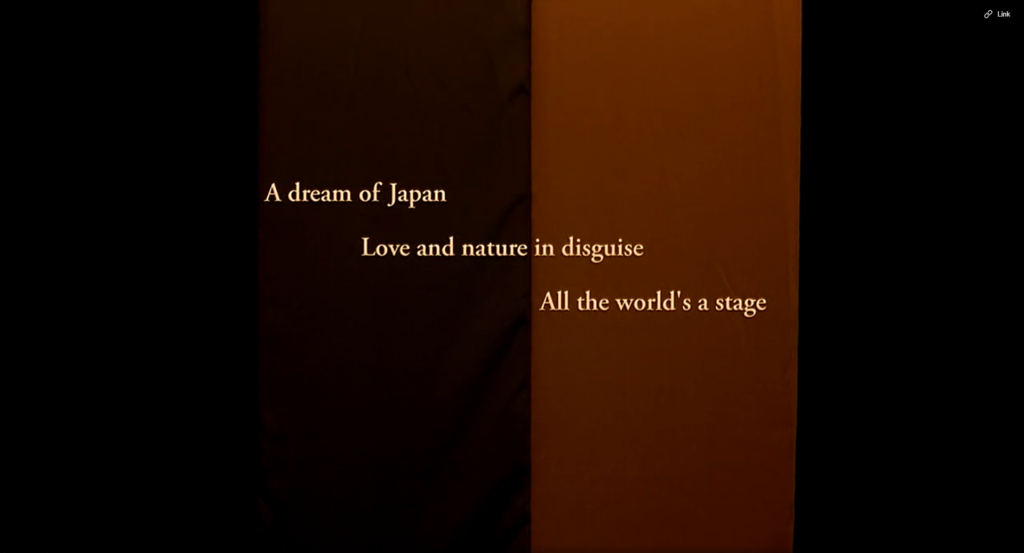
Branagh reimagines the story as being about English merchants in Japan during the latter part of the nineteenth century. This is rather random as the original play took place in neither England nor Japan but in France, but, as I wrote above, As You Like It was always rather a random play. It looks pretty and that was doubtless the point. It also sounds pretty too thanks to Patrick Doyle’s musical score. It’s a rather soporific soundtrack but I consider that appropriate for this unusually laid-back Shakespearean comedy. All of the casting is wonderful and, as is the norm with Branagh productions of Shakespeare, everyone delivers their artificial and iconic lines as if they were things that just popped into their head. Bryce Dallas Howard as Rosalind is especially great at this. I’ve heard some critics opine that Rosalind doesn’t feel like as major a character in this movie as she should be, but I don’t see that at all. True, there’s no way anyone would be fooled by her male disguise in real life, but it’d be unreasonable to expect an actress to be luminously beautiful, entertainingly cheeky, have great chemistry with her costars, speak Shakespeare like it’s her native tongue and be a convincing boy.
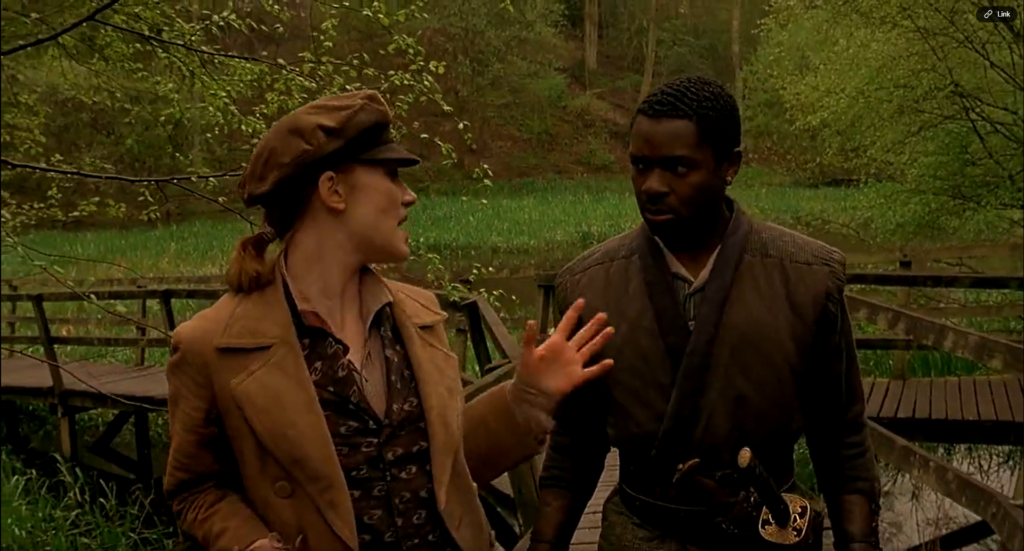
Branagh does a great job restructuring As You Like It to work as a movie. He begins with a gripping wordless scene of Duke Frederick (Brian Blessed) attacking his brother (also Brian Blessed)’s court, which establishes nearly all of the characters and their relationships to each other. You could argue this scene is a bad choice for setting the tone of this non-action movie, but I’d argue that was always a problem with As You Like It. It’s not like there was never any action in it, such as the wrestling match between Orlando de Boys (David Oyelowo) and the mighty Charles (Nobuyuki Takano.) The movie also shows another action scene that was only described in Shakespeare as it would have been difficult to stage.
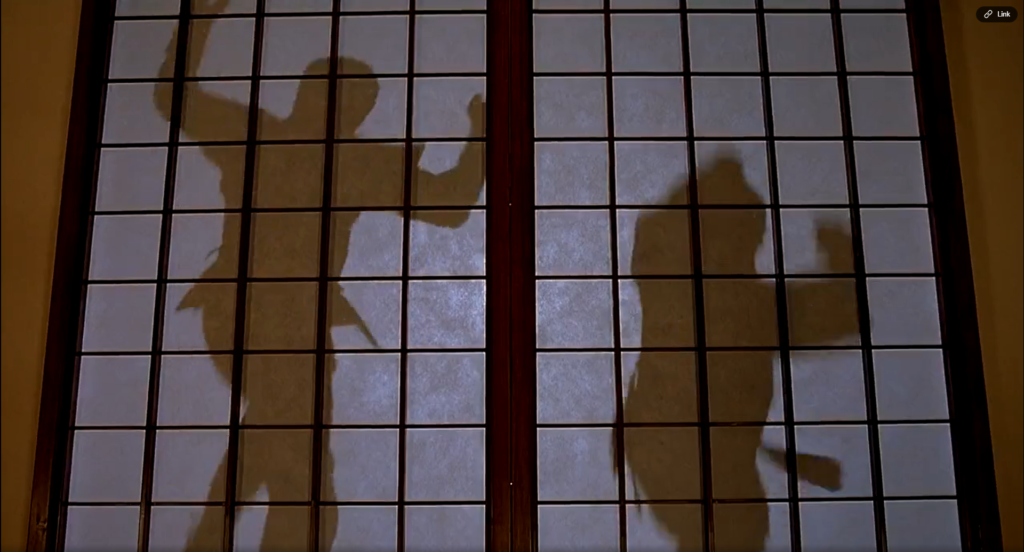
This As You Like It deals with the dramatic problems of the text about as well can done, short of rewriting the whole story. The offstage “old religious man”[2]Sadly, I can’t find who plays him. who plays such a pivotal role in the resolution is wordlessly introduced here in early scenes. Branagh and the actors lay the groundwork for the redemptions of Frederick and Orlando’s brother, Oliver (Adrian Lester), making them sympathetic whenever they can, though they do miss a trick. In Frederick’s first scene from the play, Shakespeare wrote him as being initially friendly toward Orlando, only becoming hostile upon learning that he’s the son of an old enemy of his. Blessed however comes across as brooding and menacing from the start. Still, when the villains do show vulnerability, they do so compellingly. And the final scene has a touching moment between Celia (Romola Garai) and her father, original to this version.
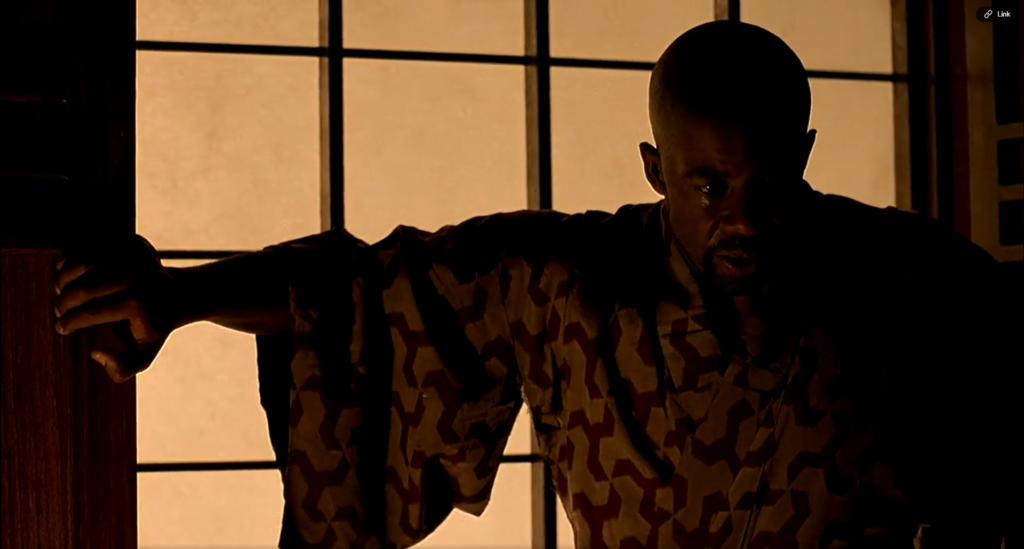
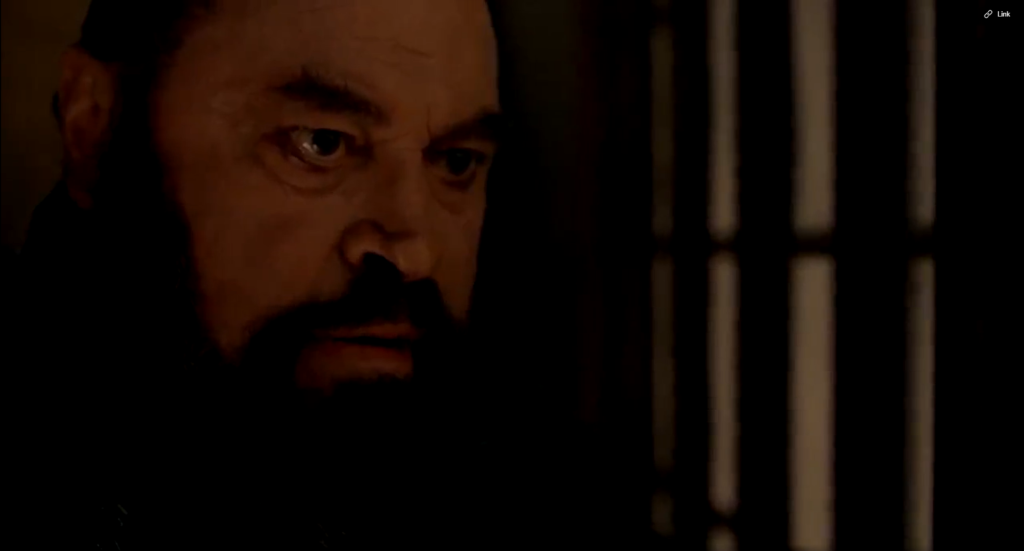
Jacques (Kevin Kline), the Eeyore of Arden, is portrayed more sympathetically here than in the original play. Not that he was ever a really negative character, but the movie takes his philosophizing more seriously. His accusation that the banished duke by hunting deer is as much a usurper as his brother, which in Shakespeare was laughed off as pretentiousness, is given some weight here. Rosalind and Orlando still run verbal rings around him in their conversations though.
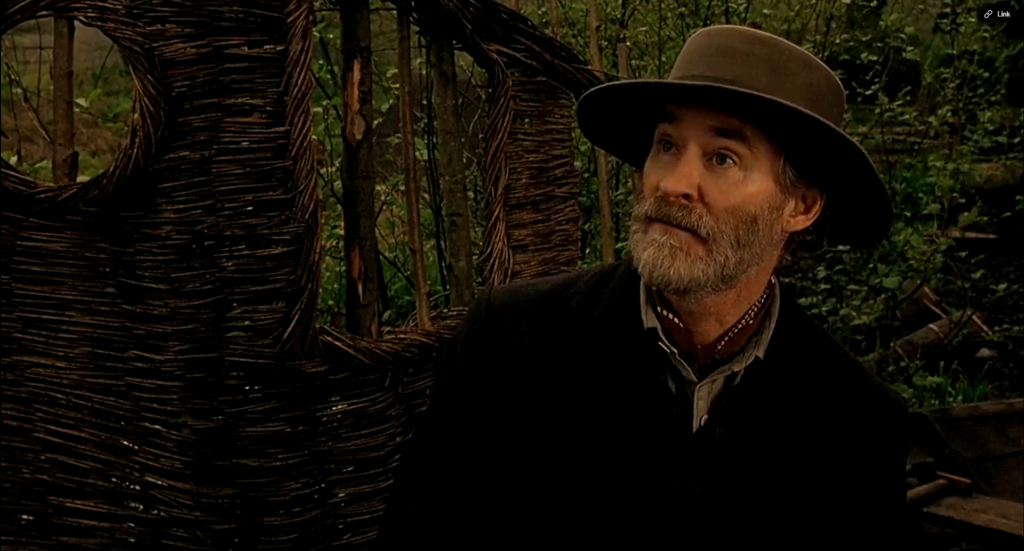
The dysfunctional romance between Touchstone the jester (Alfred Molina) and Audrey the goatherd (Janet McTeer) is made less potentially unpleasant here by the addition of slapstick humor.[3]In Shakespeare’s culture, bearbaiting was the norm, so it should be no surprise that his comedy was occasionally meanspirited. Audrey may not be able to retaliate verbally when Touchstone insults her, but rather than simply not understand him, she responds with physical force-an area where she easily bests him.[4]The slapstick also arguably serves to distract from a curious quirk of Shakespeare’s comedies: the malapropisms and “chop logic” of their clowns are less funny than the banter of … Continue reading I don’t understand why this adaptation makes Audrey another refugee from the court rather than an Arden native when the whole point of her relationship with Touchstone is that they’re from incompatible worlds, but oh well.
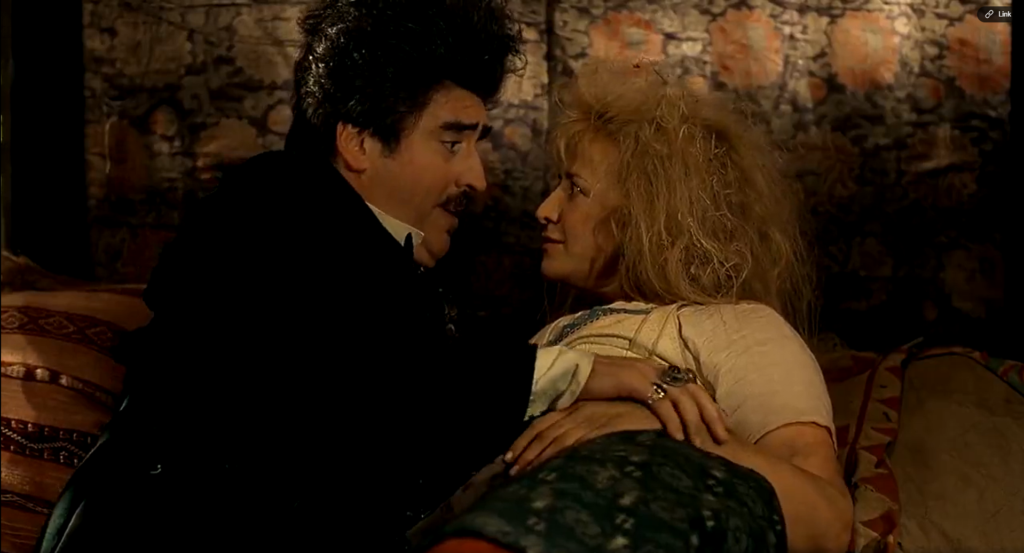
Another thing I don’t understand is the new implied backstory for Corin the old shepherd (Jimmy Yuill), giving him the power to perform marriage ceremonies. This allows to him take on the roles of Sir Oliver Mar-Text, the priest of questionable credentials, and Hymen the classical god of marriage. It’s a combination of characters that makes no thematic sense considering that the whole point of Sir Oliver is that no wedding ceremony he performs would be binding and Hymen is the one who ultimately marries all the couples. The motivation behind the change seems to be that Corin is an admirable character and Yuill an admirable actor and the more of them, the better. I can understand that.
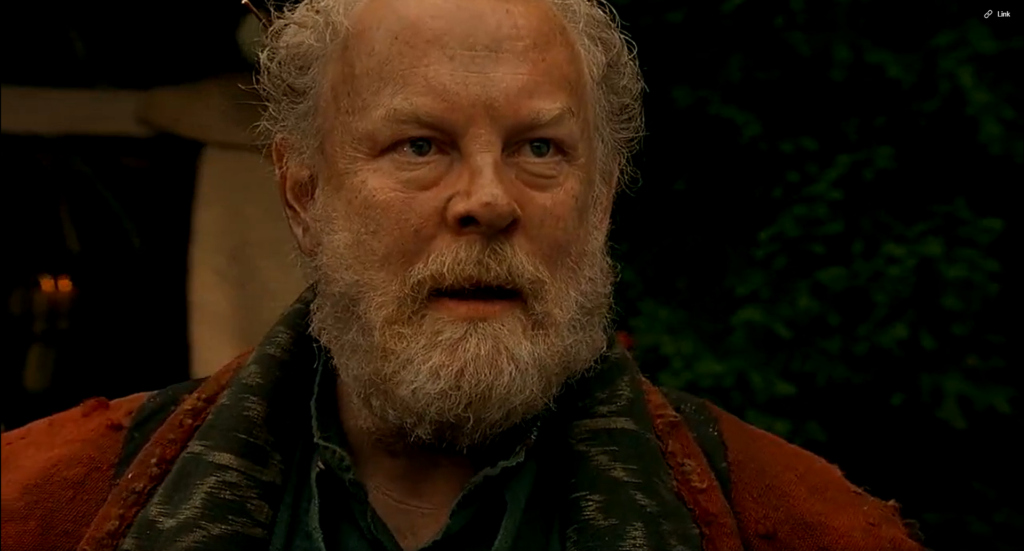
If there are any characters whom the adaptation really lets down, they’re the dysfunctional shepherd couple, Silvius (Alex Wyndham) and Phebe (Jade Jefferies.) (I’d like to stress I’m talking about the script here, not the actors. It’s a pity this is Jefferies only IMDB credit.) Because most of Phebe’s arrogant and disdainful lines have been cut, Rosalind’s criticism of her comes across as overblown. And the device by which their plotline is ultimately resolved is harder to follow because of some other cut lines. I can sympathize with the pacing reasons behind those cuts though.
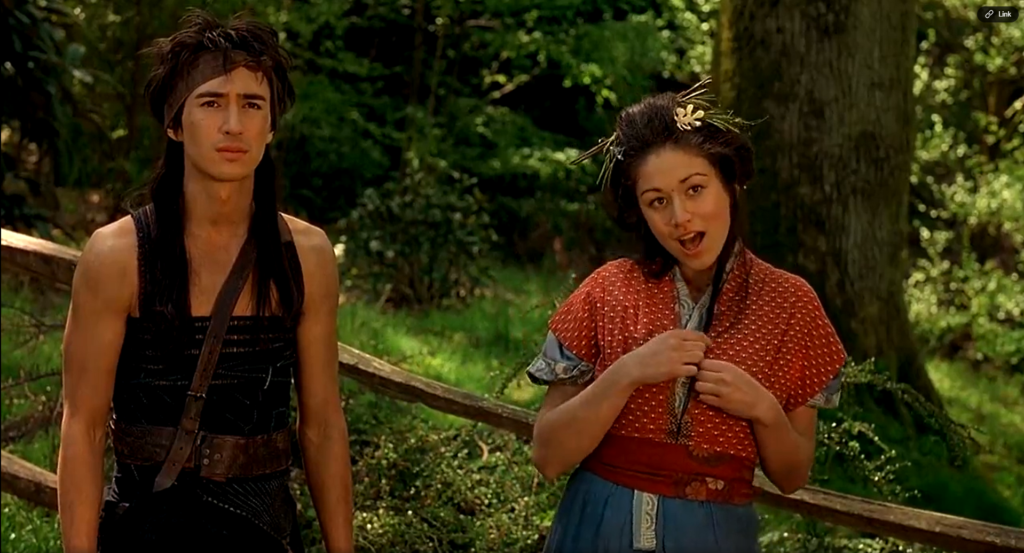
One of my favorite touches of this As You Like It is how it sets nearly all the scenes at the dangerous court at night and nearly all the scenes in the idyllic forest during the day. The exceptions to this are a scene in Arden where a reference to Diana, “thrice-crowned queen of night,” demands it and the final scene where all the all exiles are allowed to return home.[5]Sorry for giving that away, but you knew a play like this would have a happy ending, didn’t you? Seeing the hitherto dark and gloomy halls be flooded with bright sunshine makes for an especially joyous end to this most joyous of Shakespeare movies.

References
| ↑1 | In this way, it can be seen as the comedic equivalent of Hamlet, which sounds like a ridiculous story in retellings and needs to be performed to be compelling. |
|---|---|
| ↑2 | Sadly, I can’t find who plays him. |
| ↑3 | In Shakespeare’s culture, bearbaiting was the norm, so it should be no surprise that his comedy was occasionally meanspirited. |
| ↑4 | The slapstick also arguably serves to distract from a curious quirk of Shakespeare’s comedies: the malapropisms and “chop logic” of their clowns are less funny than the banter of their semi-serious lovers. The exceptions that prove this rule are, of course, the “rude mechanicals” of A Midsummer Night’s Dream. |
| ↑5 | Sorry for giving that away, but you knew a play like this would have a happy ending, didn’t you? |
